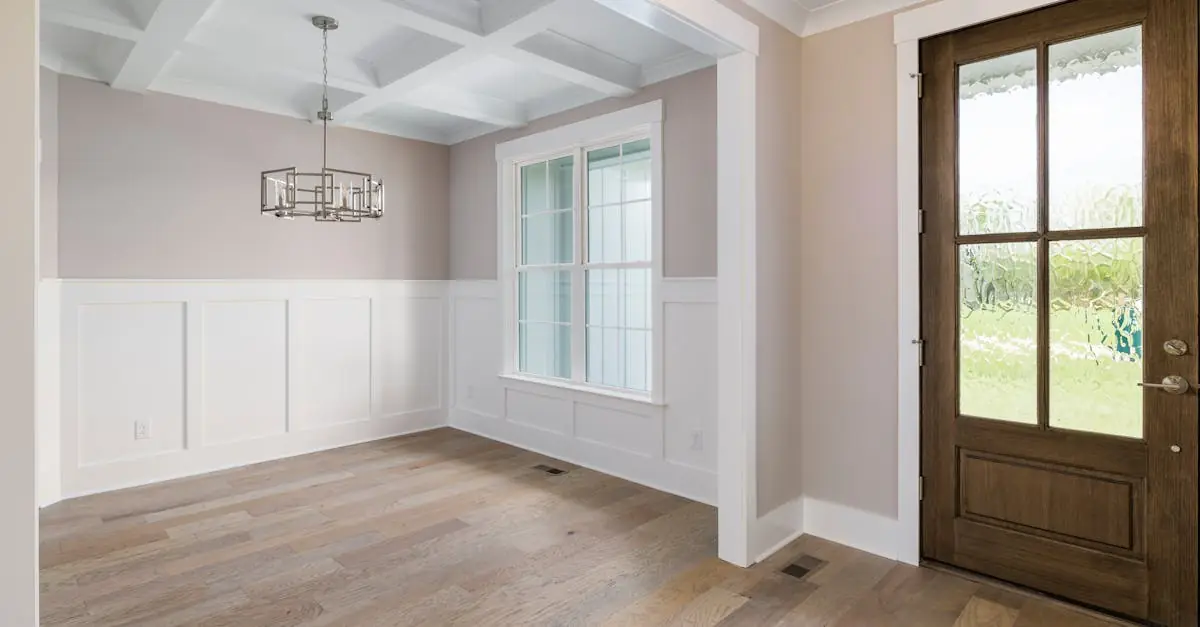Table of Contents
ToggleDeciding between renting and buying a second home can feel like choosing between a cozy blanket and a hot cup of cocoa on a chilly day—both have their perks, but only one will keep you warm in the long run. As more people consider investing in a getaway or a vacation spot, the debate heats up. Should one dive into the world of property ownership or embrace the flexibility of renting?
On one hand, buying offers the thrill of ownership, potential equity, and the ability to paint those walls any color they fancy. On the other, renting provides freedom, fewer responsibilities, and the chance to avoid the joys of home repairs. With so many factors to weigh, it’s time to explore the pros and cons of each option and help you make the best choice for your next adventure.
Overview of Second Homes
Second homes serve various purposes, such as vacation retreats or investment properties. Many buyers consider them a means to enjoy leisure time while potentially generating rental income. Market trends indicate a rising interest in second homes, with approximately 13% of home sales classified as vacation properties in recent years.
Investing in a second home provides multiple benefits. Owners gain equity over time, which may appreciate significantly based on location and market conditions. Personalization becomes a unique opportunity, enabling homeowners to create a space tailored to their preferences.
Renting offers a different set of advantages. It allows individuals to experience different locations without long-term commitments. Reduced responsibilities characterize rental living, as landlords typically handle maintenance and repairs. Flexibility remains a key factor, enabling renters to relocate or adjust their living situation based on changing needs.
Financial considerations also play a critical role in the decision. Buyers face upfront costs, including down payments and closing fees, which can range from 3% to 20% of the property value. Renters usually incur monthly rental payments that provide immediate affordability without additional financial burdens.
Different locations influence choices as well. Second homes in vacation hotspots often appreciate faster due to high demand, while urban rentals may offer better stability. Seasonal markets can complicate both rental and purchase decisions, with varying potential for income.
Understanding these elements contributes significantly to informed decision-making regarding second homes. Each option offers distinct benefits and challenges that resonate differently with individual preferences and financial goals.
Renting a Second Home
Renting a second home offers various advantages and challenges that potential renters should consider.
Benefits of Renting
Flexibility stands out as a significant benefit of renting a second home. Renters can choose the duration of their stay, allowing them to explore multiple locations without long-term commitments. Lower upfront costs also appeal to many. Unlike buyers, renters avoid hefty down payments and closing costs, making immediate affordability a key advantage. Maintenance responsibilities often fall to property owners, relieving renters from costly repairs and upkeep. Seasonal rentals can provide excellent opportunities for vacations in desirable areas, enhancing overall experience. Lastly, renting can ease financial strain, particularly during uncertain economic times, allowing access to a getaway without heavy financial burden.
Drawbacks of Renting
While renting has many perks, it also presents notable drawbacks. Lack of ownership means renters do not build equity in the property. Consequently, their financial investment does not grow over time as it typically would for homeowners. Rent increases can pose an unexpected challenge, potentially making long-term affordability difficult. Limited customization options also frustrate some renters, as personal touches typically require landlord approval. Dependence on landlords for maintenance can lead to situations where urgent repairs take time. Finally, choosing a rental in a seasonal market may lead to availability issues during peak times, resulting in fewer options overall.
Buying a Second Home
Purchasing a second home presents numerous benefits worth considering.
Advantages of Buying
Equity growth stands out as a significant advantage of buying a second home. Homeowners can build wealth over time through property appreciation. Personalization also enhances the appeal; owners can modify their space to their liking, creating a tailored environment. Rental income offers additional financial flexibility; homeowners can leverage vacation properties during peak seasons. Tax deductions on mortgage interest and property taxes further improve the financial benefits of ownership. Stability in housing costs provides peace of mind; fixed-rate mortgages offer predictable monthly payments.
Disadvantages of Buying
Considerable upfront costs accompany the purchase of a second home, often daunting for many buyers. Ongoing maintenance obligations may become burdensome; property upkeep and repairs fall entirely on homeowners. Market fluctuations can affect property values, introducing financial risk. Owners in seasonal markets might face challenges with inconsistent rental income, potentially leading to periods of vacancy. Time commitment increases, requiring owners to manage logistics, upkeep, and potential tenant relationships. Selling a home can be an extensive process, complicating future financial decisions.
Financial Considerations
Understanding the financial implications of renting versus buying a second home proves crucial in making an informed decision. Costs impact long-term investments, immediate expenses, and overall financial stability.
Initial Costs
Upfront expenses play a significant role in the decision-making process. Buyers typically face larger initial costs, which include down payments, closing costs, and inspection fees. For instance, down payments often range from 5% to 20% of the home’s price. Renters, on the other hand, encounter lower initial financial commitments. Rental security deposits usually amount to one month’s rent, making it easier to secure a property without substantial financial pressure. Buyers must also account for property taxes and homeowner’s insurance in their initial costs, while renters typically have fewer financial responsibilities, such as maintenance costs.
Long-Term Financial Implications
Long-term financial impacts differ greatly between renting and buying. Buyers can build equity as property values increase, offering potential financial benefits. Real estate, particularly in vacation hotspots, shows appreciation rates averaging 4% annually, which can enhance long-term investment returns. Renters don’t enjoy this advantage, as monthly payments contribute to the landlord’s equity without building their own. Additionally, owning a home may provide mortgage interest and property tax deductions, further improving overall financial benefits. Renters face the possibility of rising rent costs over time, which can strain budgets. Buyers secure predictable fixed-rate mortgage payments, enhancing financial stability throughout homeownership.
Personal Considerations
Personal considerations play a crucial role in the decision between renting and buying a second home. Evaluating individual circumstances ensures informed choices that align with lifestyle goals.
Lifestyle and Flexibility
Renting a second home provides significant flexibility. Renters can easily choose the duration of their stay, allowing for spontaneous trips. They avoid the responsibilities of property maintenance, which can be a time-consuming burden. This arrangement suits those who prioritize travel or have varying schedules. Additionally, seasonal markets often attract renters, especially in vacation hotspots. Renting allows individuals to experience different locations without the long-term commitment of ownership. Ultimately, the adaptability of renting aligns well with diverse lifestyles.
Future Plans
Future plans heavily influence the decision-making process. Individuals contemplating career changes or relocations may find renting advantageous. Investing in a second home often requires a commitment to permanence that may not suit everyone. Buying generally appeals to those intending to remain in one area long-term, especially if they seek property appreciation. Homeownership also offers opportunities for rental income, enhancing financial stability during peak seasons. Individuals who foresee substantial life changes should weigh these factors carefully. Understanding future aspirations aids in determining whether renting or buying fits personal goals better.
Deciding between renting and buying a second home involves weighing personal preferences against financial realities. Each option offers distinct advantages that cater to different lifestyles and future plans. Renting provides flexibility and lower initial costs while buying allows for equity growth and customization.
Ultimately, the right choice depends on individual circumstances and long-term goals. Those seeking stability and investment may lean towards purchasing, while those valuing flexibility might prefer renting. By carefully considering these factors, individuals can make a decision that aligns with their aspirations and enhances their overall experience in their second home journey.





